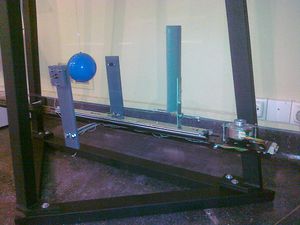Precision Pendulum Assembly
THIS PAGE IS STILL WORK IN PROGRESS
This page is intended to serve as the assembly instructions for the Precision Pendulum, particularly following the setup developed for the WPA project. This page starts with a brief description of the apparatus and its core components. Then it is followed by the description fo the assembly process which is divided into three core parts: the Mechanical assembly, the electronic controller assembly and the calibration of the setup. An additional step is described for those who want to allow "non-remote" operation (ie: local operation in a museum or common area with public access).
Contents
Non-remote usage
For local use, the gate system can drive an up/down counter. Currently, we have adopted the Velleman multifunction up/down counter kit K8035 avaiable off-the-shelf. The connection to the photo-diode is done via the VCC to the UP channel (pin 9) using just the first (R14) 2,2k resistor and eliminating the protection circuit in the transistor's gate (ZD1, R15 and R18).
The device should operate with Long debounce enable. Moreover we can use the regulated power supply (5V) in series with a 33 Ohms resistor to feed the photogate's laser pointing device.
Gate system
To avoid a long run of the experiment to achieve a reasonable period accuracy readout with a normal chronometer one could use instead of a gated photo-detector connected to an acquisition system or to a precision pulse counter.
The World Pendulum design can be easily adapted as it consists on a photodiode mounted in a aluminium (or PVC) holder (20x20x6 mm3) with a central 1,5mm hole and a 4mm cavity on the back side(see design) where is fixed the photodiode with a black plastic wax.
In front of the photodiode, a solid-state laser beam from a normal pointer device is used to trigger the counter once the ball hide the light.
Partners
Mechanical structures in suport of high schools replicas have been assembled and constructed with the kind help of CENFIM, Lisbon.

